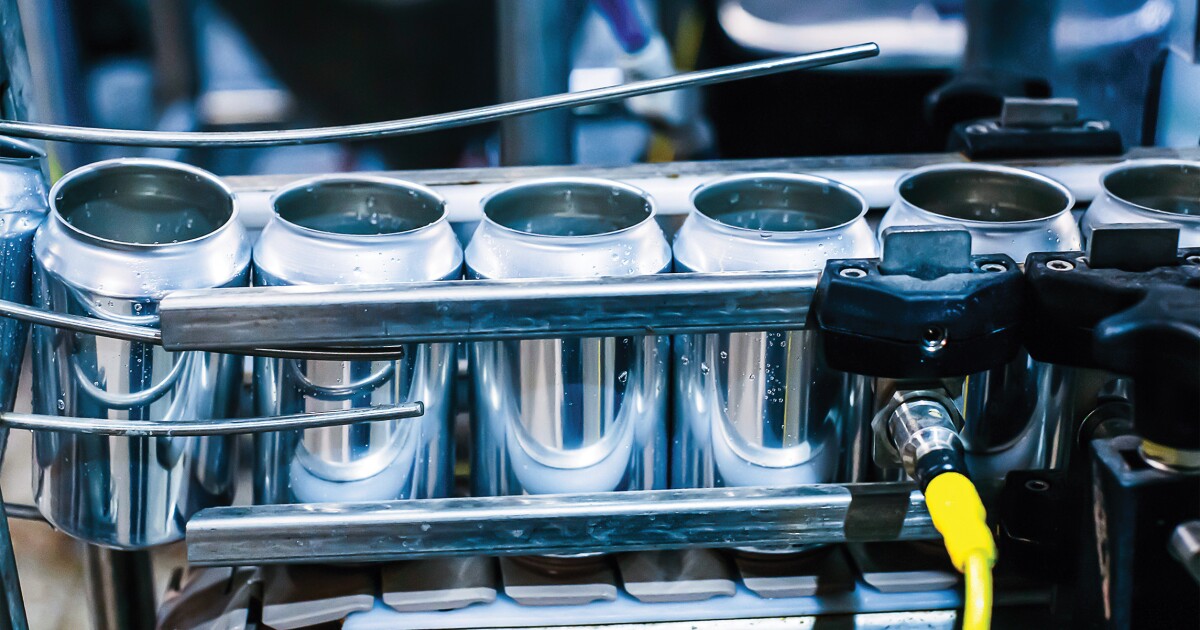

Beer drinkers are increasingly choosing to consume the beverage from cans, and aluminum tariffs put in place during former President Donald Trump’s administration have the industry hopping mad.
Trump’s protectionist trade agenda during his four-year White House run included 10% tariffs on aluminum, imposed in 2018, along with a 25% steel tariff. Trump said the goal was to shrink the U.S. trade deficit and bring back more manufacturing stateside. Industries affected have since that time said the tariffs would only lead to higher prices for consumers, likely hurting their own bottom lines.
GAS PRICES TODAY: WHERE TO FIND THE CHEAPEST FUEL ACROSS THE COUNTRY
The beer industry is no exception, which is contending the policies harm U.S. producers of the drink and cost them billions of dollars — with little or no upside.
In the five years since the aluminum tariffs were imposed, the U.S. beverage industry has paid more than $1.893 billion in taxes, according to an April report by the Beer Institute, which is the national trade group that represents companies that produce and import beer sold in the United States. “It’s now been five years since Section 232 tariffs on aluminum were enacted, and America’s brewers continue to feel the squeeze,” said Brian Crawford, president and CEO of the Beer Institute. “The last thing consumers and the 2 million Americans whose livelihoods depend on beer need is more financial stress caused by these shortsighted and unnecessary tariffs.”
The beer industry is looking to President Joe Biden’s administration for help. “We continue to urge President Biden to lift the aluminum tariffs and not to add any additional tariffs that drive up the cost of living for hardworking Americans and hurt American job creators like brewers and other critical manufacturing industries that depend on aluminum,” Crawford added.
Biden has kept the tariffs in place despite the lobbying from the beer industry, although the administration did partially loosen the tariffs with certain U.S. trading partners. In 2021, the administration replaced the aluminum tariff with a tariff-rate quota on imports from the European Union, which allows some amount of aluminum to be imported into the U.S. duty-free. Additionally, there is not a tariff for Mexico or Canada, the latter of which is a major producer of aluminum.
Still, because of how the market works, prices for aluminum are still tariff-burdened. Rolling mills and smelters include tariffs in their prices, meaning that brewers and beverage producers are still being forced to pay tariff-level prices even with the exemptions for places such as Canada, according to the Beer Institute.
Mary Jane Saunders, vice president and general counsel for the Beer Institute, highlighted the situation during an interview with the Washington Examiner. “What makes this kind of a really amazingly bad situation is that the beer and beverage industry is paying tariffs on metal that is not actually subject to tariffs,” Saunders said.
Saunders explained that most of the metal used in a beer can or any type of soda can is actually made from mainly recycled metal and scrap. None of that recycled metal is actually subject to tariffs, and most of the remaining product that goes into cans is produced domestically.
There is not just one type of aluminum that goes into beer and soda cans. The first is primary aluminum, which is likely what one would picture when thinking about aluminum used in manufacturing: big hunks of metal that are smelted in an aluminum smelter. The other type is recycled aluminum and scrap.
Many of the smelters are located in Canada, and there is a handful in the U.S. Part of Trump’s reasoning with the tariffs was that they could help the domestic smelters survive competition from other countries. So a tariff on all primary aluminum coming into the U.S. was levied in 2018, Saunders said. When it comes to a beer can, maybe 25% of the metal in a beer can comes from primary aluminum, and the rest is recycled aluminum and scrap, Saunders estimated. “You would think we shouldn’t be paying a tariff on something that’s domestic, but the industry has to pay a tariff because tariffs are now built into the price of all aluminum in the United States,” she said.
Saunders noted that while the primary aluminum being shipped down from Canada is no longer subject to U.S. tariffs, beer producers are still feeling the burn from tariffs. “The Canadian smelters still charge a tariff so that even though they don’t have to pay a tariff to the federal government, they’re charging anybody who is buying their metal a tariff price,” she said.
The beer industry is a big one, too. A study of the industry released in April found there are 2.37 million jobs supported by the beer industry and that the annual U.S. economic impact is more than $400 billion, equivalent to 1.6% of GDP. Additionally, there has been an expansion in the space: The number of distributor jobs has increased by more than 6.3% over the past 10 years.
The Beer Institute has now been lobbying for tariff relief for five years and is still working to overturn the remaining aluminum tariffs. Saunders said a big part of the Beer Institute’s effort is educating people.
CLICK HERE TO READ MORE FROM THE WASHINGTON EXAMINER
“A lot of people think that businesses, foreign producers, are paying these tariffs. But in fact, it’s U.S. businesses that are paying the tariffs,” she said. “This money is not going to the federal government. It’s going the pockets of private businesses.”
The group has talked to the Biden administration about the matter, and Saunders said her organization is trying to figure out some possible legislative solutions for the issue and is actively lobbying on Capitol Hill.





